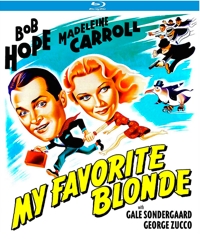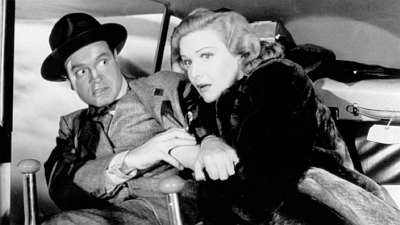 Grade: B/B-
Grade: B/B-
Comedy
Not rated (would be PG)
Comedian Bob Hope received a record five honorary Oscars and also has a record four stars on the Hollywood Walk of Fame. But those awards are dimmed by the Congressional Gold Medal he received, the Presidential Medal of Freedom that Pres. Lyndon B. Johnson awarded him, the Medal of Liberty he got from Pres. Ronald Reagan, the National Medal of Arts he received from Pres. Bill Clinton, the knighthoods he received from two Popes, and the honorary knighthood that Great Britain bestowed upon him. In fact, Hope has almost as many high honors as he does films—and he starred in 54 of them during a career that spanned nearly 80 years.
Yeah, you’re probably thinking, but are his films any good? For the most part, Hope’s films fall in the three-star category (out of four). And speaking of stars, five-star Gen. Dwight D. Eisenhower presented Hope with the Medal of Merit “in recognition of his wartime contributions to morale on the homefront as well as on virtually every war front.” Which is to say, besides entertaining the troops, as he did his entire life starting in 1941, Hope also starred in a number of wartime films that both entertained audiences and reinforced patriotic themes.
 My Favorite Blonde is one of those WWII-era films. This 1942 black-and-white comedy features Hope in a familiar role: a vaudevillian who unwittingly finds himself in the middle of an adventure or intrigue. This time Larry Haines (Hope) and his trained roller-skating penguin Percy are headed for Los Angeles, where the movies want to sign the penguin—not his trainer. But that was before he ran into British secret agent Karen Bentley, or rather she planted a scorpion brooch on him containing the flight plans for 100 American bombers. Back then Americans weren’t as paranoid as they are now, but there was still a sense that a “fifth column” might be operating as underground spies in the U.S.A. German agents (led by screen veteran Gale Sondergaard) are in pursuit, and as irrational as it seems for plans for a European war to start out in New York City, move to Albany, then Chicago, and finally L.A., what entertains about Bob Hope movies is less the plotting than it is Hope’s character, antics, and interaction with a woman that he eventually gets—if Road picture crooner-crony Bing Crosby isn’t co-starring. More
My Favorite Blonde is one of those WWII-era films. This 1942 black-and-white comedy features Hope in a familiar role: a vaudevillian who unwittingly finds himself in the middle of an adventure or intrigue. This time Larry Haines (Hope) and his trained roller-skating penguin Percy are headed for Los Angeles, where the movies want to sign the penguin—not his trainer. But that was before he ran into British secret agent Karen Bentley, or rather she planted a scorpion brooch on him containing the flight plans for 100 American bombers. Back then Americans weren’t as paranoid as they are now, but there was still a sense that a “fifth column” might be operating as underground spies in the U.S.A. German agents (led by screen veteran Gale Sondergaard) are in pursuit, and as irrational as it seems for plans for a European war to start out in New York City, move to Albany, then Chicago, and finally L.A., what entertains about Bob Hope movies is less the plotting than it is Hope’s character, antics, and interaction with a woman that he eventually gets—if Road picture crooner-crony Bing Crosby isn’t co-starring. More

